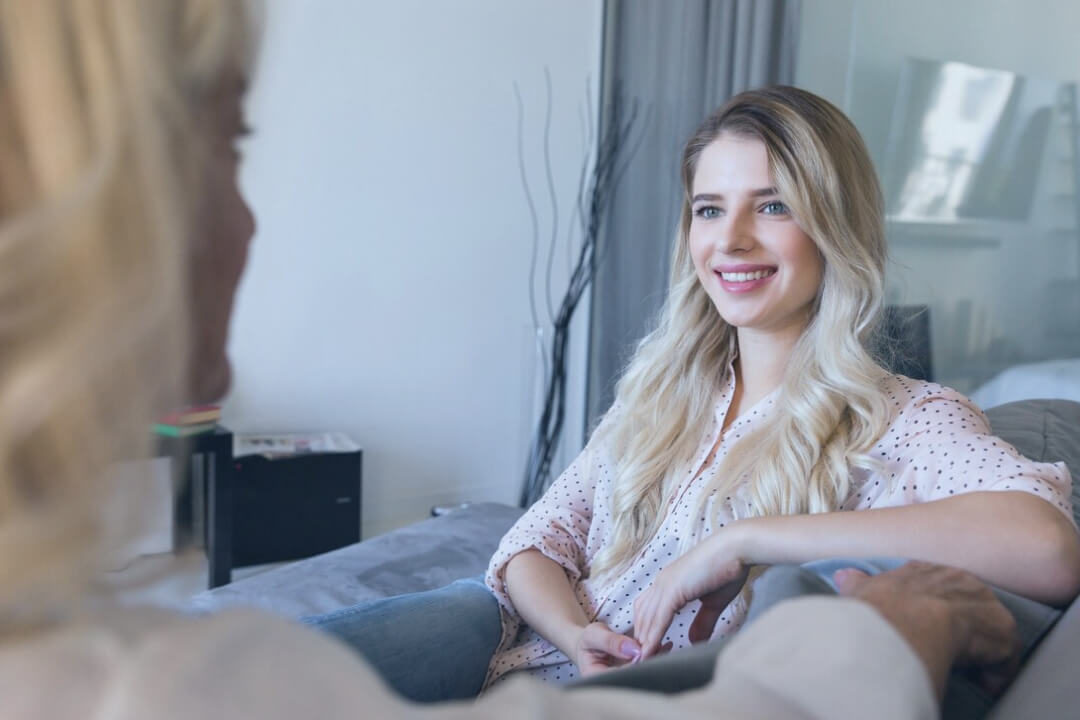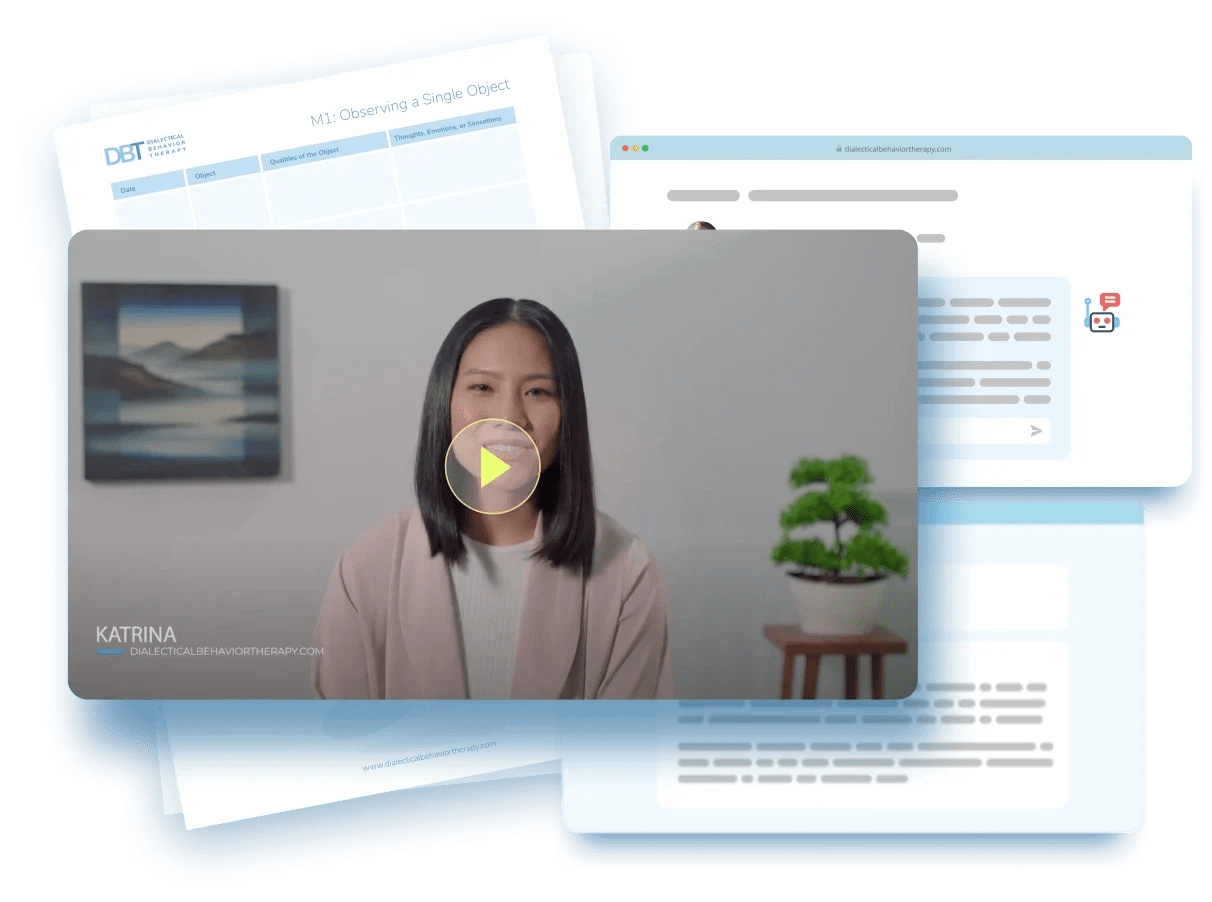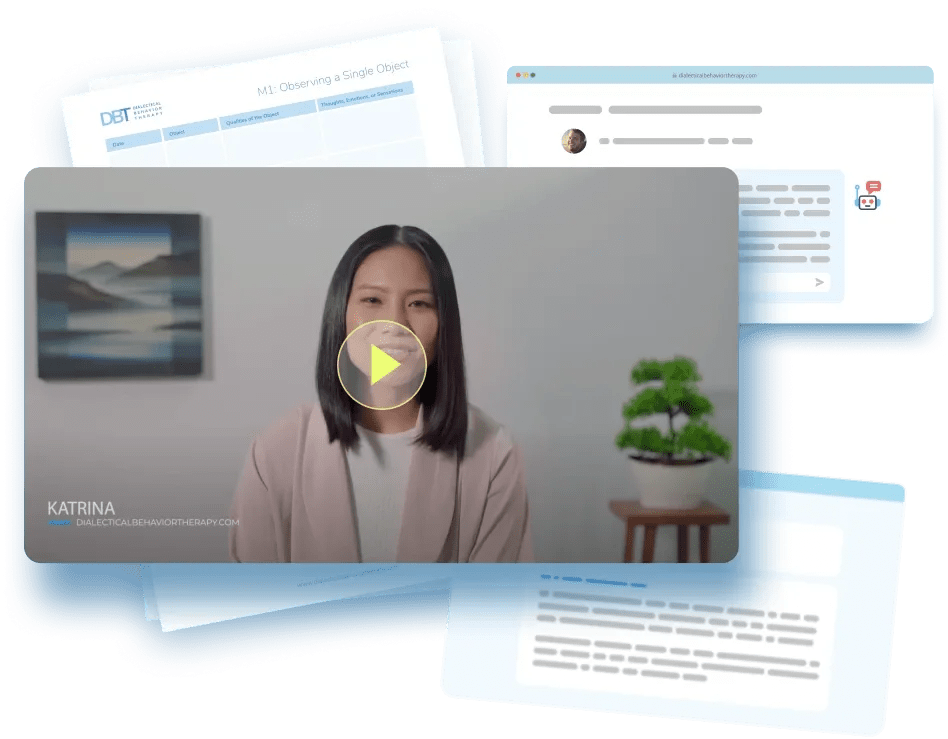What is Mindfulness?
We live busy lives – from the time we wake up, we are bombarded with tasks that need to be finished. We make breakfast, go to work or school, commute while listening to music or talking on the phone, or playing video games. This takes a lot of brainpower so our amazing minds learn to autopilot.
This autopiloting behavior is efficient, but it comes with a downside – have you noticed how well-rested you are, how delicious your breakfast is, or how pretty the flowers are on your way to work? Autopiloting lets your mind wander, often leading to thoughts of fear, worry, anxiety, or dread.
This is where the skill of mindfulness comes in.
Mindfulness is about taking control back and focusing on what is happening now - without judgment. Focusing on the present helps you shift attention away from anxiety-inducing thoughts, which are usually rooted in the past or future.
Mindfulness Skills as a DBT Module
Dialectical Behavior Therapy incorporates four key modules, with mindfulness as the foundational element. This crucial component is often the starting point in therapy, providing essential groundwork for the other three modules: distress tolerance, emotion regulation, and interpersonal effectiveness.
By first establishing mindfulness skills, psychologists set the stage for more effective learning and application of the remaining DBT concepts.
What Mindfulness Skills are taught in DBT?
The Mindfulness Skills taught in DBT are “What” Skills and “How Skills”
- 1
Observing Perceiving your present experience without filtering or judging it:
- 2
Describing Putting words to your observations:
- 3
Participating Fully immersing yourself in the current activity with undivided attention
- 4
One-Mindfully Emphasizes doing one thing at a time
- 5
Effectively Focusing on what works and doing what is needed for the situation, not what your emotions dictate
- 6
Nonjudgmentally Seeing things as they are, without adding labels like “good”, “bad”, “right” or “wrong”
How Do These Mindfulness Techniques Help?
The mindfulness techniques taught in DBT play an important role in enhancing your ability to manage emotions, cope with stress, and improve relationships.
By cultivating a mindful awareness of the present moment, you learn to observe and describe your thoughts and feelings without judgment. This heightened awareness is crucial in helping you break the cycle of automatic, often negative, thought patterns that can lead to emotional distress.
Benefits of Mindfulness
Even if you do not need therapy, practicing mindfulness in your daily life can be very beneficial. Here are some of the benefits of practicing mindfulness:
- Overall Wellbeing. By practicing the habit of focusing on what is happening now, you are able to enjoy the activities you are currently partaking with, without fearing the future or worrying about the mistakes of the past. People who are not fearful or anxious are less stressed, happier, more energetic, and are more deeply connected with others.
- Getting Better Sleep. Practicing mindfulness can give you better sleep quality by reducing your stressful thoughts to help your mind relax, a state that leads to a more restful sleep.
- Lowered Blood Pressure. Mindfulness is known to reduce blood pressure by enhancing attention control and emotion regulation, encouraging a state of relaxation.
- Pain Management. Mindfulness helps with pain associated with fibromyalgia, migraine, chronic pelvic pain, irritable bowel syndrome, and other conditions.
- Enhanced Focus and Concentration. Individuals who practice mindfulness report improvements in concentration and the ability to focus.
- Helps with Stress, Anxiety, and Depression. Multiple studies were conclusive that mindfulness exercises do relieve stress anxiety and depression.
- Weight Control and Eating Behavior. Mindfulness helps you control weight by helping reduce binge, emotional and restrained eating.

Should I Get a Mindfulness Coach?
If your problems are common, like stress or anxiety, you can start with online videos of mindfulness exercises to see if they help. The DBT mindfulness exercises found in this page are sufficient enough to help reduce stress and help with anxiety.
If you have specific problems, are in uncommon situations or need a tailored mindfulness program, then you will need the help of a mindfulness coach.
How Much Do Mindfulness Coaches Charge?
Mindfulness coaches charge differently by qualifications, experience, location and your needs. However, in the US, the national average is $150 per session.
How About A Virtual Mindfulness Coach?
Mindfulness coaches generally charge the same amount for virtual coaching. Favored software include Google Meet, Skype and Zoom. Again, we encourage you to take our free DBT mindfulness exercises, videos and worksheets, to see if they help.
How Does Guided Mindfulness Meditation Work With A Coach?
Guided mindfulness meditation includes a mindfulness coach who will lead the meditation:
- Creating the Perfect Atmosphere. Your coach will set up a peaceful, welcoming space that's just right for mindfulness meditation.
- Guiding You Through. They will give you easy-to-follow instructions during the mindfulness session. They'll walk you through each step.
- Exploring Mindfulness Techniques. Your coach might introduce you to different techniques, like body scans, focusing on your breath, or just observing your thoughts as they come and go – kind of like what you see in our DBT videos!
- Tailored Just for You. What's really great about having a coach is the personal touch. They'll adapt the session to fit exactly what you need and help with any unique challenges you're facing.
- Bringing Mindfulness into Everyday Life. After your meditation, your coach will share tips on how to keep that mindful state going throughout your day.
- Keeping Track of Your Journey. With regular meet-ups, your coach will help you see how far you've come and tweak your practices to keep you on track.
- Your Emotional Cheerleader. A mindfulness coach creates this safe, understanding space where you can freely explore your thoughts and feelings during your practice. It's another solid reason to consider getting a coach.

Subscribe.
Get the DBT course. Free!
Get your full access to our 26-week DBT course.
Lessons emailed to you twice a week.

Frequently Asked Questions
Teaching mindfulness to children in the form of a game can be rewarding. Some examples of mindfulness activities for kids include:
- Balancing on one foot
- Lying down and focusing on each body part
- Heartbeat exercise
- STOP (stop, take a breath, observe, proceed)
- Rainbow breath exercise
- Blindfolded taste test
- How I feel today
- Mindfulness pennies game
Incorporating mindfulness into our lives can have a huge positive impact. Here are some ideas:
- Mindful breathing can be done to help calm ourselves when stressful events happen.
- During conversations, you can practice one-mindfully and focus on listening and understanding what they are saying.
- Same with work or study. Practice one-mindfully and focus on working and achieving your goal.
- You can achieve a better understanding of your diet by being mindful of what you have eaten and plan to eat throughout the day.
- Everyday, you can do a mind-body scan to see if your body and mind are still in shape.
- You can appreciate nature trips more if you incorporate mindfulness into the experience. How cool is it? Do you hear the birds? How does that fruit taste? Savor each sensory experience to enjoy it more.
- Same with art. Being mindful of the colors, textures and how the art makes you feel will help you appreciate the beauty in art more.
- Being mindful of your exercise helps you get the most of your workout. Mindfulness while exercising helps you lift more, make your workouts safer and lose more fat.
- Turn your routine activities into an impromptu mindfulness exercise by focusing on your thoughts, sensations and feelings. For example, while showering, focus on how the water feels. While sitting on the train, look out the window and focus on the sky or the landscape. Observe the people, their expressions and clothes without making up a story in your head or judging what they wear or appearance.
References
- Positive Psychology. “Harnessing the power of happiness, mindfulness, and inner strength”.
- Marsha Linehan. “Mindfulness: The First Skills Module Taught in DBT”.
- PubMed. “Mindfulness-based cognitive therapy for generalized anxiety disorder”.
- PLOS ONE. “Mindfulness-Based Blood Pressure Reduction (MB-BP): Stage 1 single-arm clinical trial”.
- NIH National Library of Medicine. “Mindfulness meditation–based pain relief: a mechanistic account”.
- NIH National Library of Medicine. “Cognitive Effects of Mindfulness Training: Results of a Pilot Study Based on a Theory Driven Approach”.
- ScienceDirect. “Exploratory randomised controlled trial of a mindfulness-based weight loss intervention for women”
Waterford. “51 Mindfulness Exercises for Kids in the Classroom”.




I just found this website while looking for some resources for a client who prefers video/audio options vs. written materials. Holy smokes! I am so grateful that these videos and handouts have been made freely available. Wonderful resource. THANK YOU!
What a great website. I have been doing your DBT workshop and it helps a lot! Thank you!
I am SO happy I just found this website.
I’ve tried to find something like this for many years. I could never find anything and always wanted to start something up myself but never found the motivation. DBT is one of the reasons I am still here today. I’m excited to share this with everyone I know.
My wife is displaying terribly disturbing behavior. She is convinced that Hallucinations of morbid acts are actually happening and exhibiting EXTREME paranoia. She was diagnosed bipolar in 2015 but hasn’t taken her medicine in years. She is becoming a danger to herself & others. I am scared for her
ADMIN – Hi Brannan,
You should seek care for her from a local mental health professional.
I want to get my life back together like my sleep and depression and all that.
Hi Elli. It’s great that you want to work towards feeling better. By you being here and researching available options, it shows that you are serious and ready to do the work. We all know it’s challenging. Some days are good for me, and some days are not quite as good. I have recognized that my struggles come in waves. This helps me know that “this too shall pass”. It’s not always easy in practice but it makes it easier for me to cope with being overwhelmed. You mentioned sleep. That is so important for me. Getting my sleep routine back makes such a big difference. If I’m well rested, I can think clearly and have the strength to cope better. I’m happy you are here.
Holistic healing is the best therapy and treatment for overall wellbeing
I learned so much. Thank you!
I found this information very helpful!
Wow I am so glad I found this website! I am a therapist who is working virtually and have found this website so great for helping my clients review skills in between sessions.
I come here for help,I am a BPD with impression for years.
Addicted to nicotine
Love this website… it is like free therapy. Would someone please tell me why my insurance won’t cover this healing resource that is practiced by so many? What can we do to wake up Washington DC and the Insurance companies to the possibilities of DBT?
DBT is a therapeutic approach. DBT would not get rejected by insurance companies as a modality. Makes no sense.
Thank you for offering this to anyone and everyone!
I have been using this for patients/worksheet. This has been a phenomenal website: clear/organized and free. thank you for creating this. Clinician to Clinician you rock!!
I feel better
Excellent recommendation by my social worker, Antara Gupta, of BCCH
I’ve been doing a DBT group therapy already and this website is helping to clear up some confusion and give additional support as I’m learning the skills. Distress Tolerance! whoo!
ADMIN – Whoo!
I shared the worksheets with some of my clients. They are ever so grateful. I say all praise to you guys for providing this amazing resource. Thank you.
Brilliant!!! Whoever came up with this. Am very grateful to find and be part of this community. It is very helpful in many ways to help with our everyday struggles,-M.W.ILLIAM
Hello! I am a therapist but I have No training in DBT , this website is so informative and clear, would it be ok to put a link to your site on mine ? Let me know if that’s possible . Thanks so much!
My trauma therapist found this website for me.
While waiting for DBT Therapy to open up and working on my own in workbooks this is very helpful to gain more understanding and guidance. Appreciate you sharing this with public free.
Thank you!
I am finding the exercises awakening and potent for visualization when practicing the with my clients. Their countenance even changes to reflect the calm and I suspect mine does too. It enriches the rapport necessary for navigating the stages of change…Thank you for reminding me of this resource
THANK YOU for making this STELLAR resource on DBT available for free! And Many Many Thanks to my School Counselor for introducing me to DBT.
This is a valuable resource! Thank you so much!
Thank you soooo much
Hi! first of all, great website, thank you so much for that. How should I go through these exercises? Should I do one per day? or should I stay on each one until I feel like I mastered the skill?
Need some basic knowledge and training of DBT.thank you guys so much.it’s so concise and simplified!!it will be a help for my recovery.
Hi! First of all I wated to say that I love your work, thank you so much for this site.
I was wondering though, should I go through the lectures one-by-one each day? or should I wait until I feel like I mastered the skill?
Hi, do I have to complete all the Mindfulness exercices before moving on to Tolerance, or do I alternate categories? (I plan on doing this every day)
If you could answer I would be very grateful!
20 years ago this would have been really helpful…
I feel like I am past this.
My counselor recommended this website to me as an add-on to our sessions and honestly it has been life-changing. I have better control over my emotions than I ever had and it’s all thanks to my counselor and this website. Thank you so much for making this resource available for free!
I really enjoy my time talking to my therapist it really help me a whole lot
I am glad I gave DBT a chance and it led me through this website. Thanks for making it a free resource. Mental health care should be available to all.
This resource has been amazing. So thankful to have found this.
Hi! I was hoping someone might be able to help know what this includes (including what happens each session). Thank you
I was given your website address by the Crisis Help Line Center and I have to say that the information that I’ve read on your website page was very very helpful and useful to me. Thank you very very much. Take care.
I’ve read your informative important article on your website and it was or it is helpful and useful to me I was given your website address page from the Crisis help line texting center keep up the wonderful work have a wonderful day today take care and Good morning from me Patti Ann Vogel take care
Doing DBT has been the best experience and has helped me come so far in my journey of finding happiness and stability. Highly recommend
I work in residential treatment & have seen firsthand how DBT can help individuals with substance use disorders. This website provides insight into the various techniques used to regulate emotions, learn how to live in the moment, develop healthy ways to cope & to improve relationships! Great Find!!
I am so grateful to have found this site. This is helping me immeasurably. Thank you so much
Thank you for this website and its offerings! DBT has helped my family greatly. I’ll be sharing this far and wide!
I was struggling to apply DBT on my patient more effectively and found this. It is a blessing.
Love love this website. Thank you for making it available to us.
My therapist suggested Radical Acceptance during our session today and my YouTube search brought up your videos. Before I knew it, I had pages of notes and it was the wee hours of the morning. Thank you. Wow.
Not sure if its just me but many of the worksheets do not print to scale. Many seem oversized and only show/print a very small portion of the worksheet. Thanks in advance for fixing if it is indeed an issue on your end. Looking forward to starting the course
My husband is with someone that has all the characteristic , self harm, anger, anxiety , depression.
what can I do do take care of myself emotiona;;y
Such useful and to the point information. THANK YOU so much for keeping this available. I have completed a few exercises and can’t wait to try them all.
Regarding “many of the worksheets do not print to scale” – try downloading the worksheet, opening it in a PDF app like Adobe Acrobat (not the web browser), and then printing it.
Helpful for surface level, some of the techniques break down at closer inspection and seem flawed. Breathing exercises are tried and true for most surface level issues, awareness is helpful, have to want to change, not all are going to be aware of right things, remain vigilant. collective effort!
how would I go about working on this? Would I work on mindfulness then emotions, etc… like a 40 step? Do the first mindfulness with the with emotions, etc… together as like a 10 step plan? Do I pick an choose from mindfulness, emotions etc… and work on just that? I Need help on where to start.
Admin: People usually start with mindfulness since it is the foundation for the others. Then go for distress tolerance, emotional regulation then interpersonal.
Thank you so much for this resource. I can’t financially take my weekly classes that my doctors office offers. This resource will help me so much.
Thank you all
Who runs this website? Thank you.
I couldn’t be any more grateful that my partner came across this free DBT course and worksheets for me. I finally feel there is hope for me and my future. I could not afford private help so I am so grateful and excited to get stuck in. THANK YOU so much for your help and giving me hope.
I just started And And these exercises are working great so far so good.
There is no DBT where I live. This website is very effective. I can’t tell you how grateful I am that this is here.
Lovely! I think this will help me a lot. Thank you so much
Great content, use it with clients as homework.
I’m so grateful for this information. I registered today and I’ve begun. So thank you for providing this program. I have only one question/complaint. This information isn’t free. I shared my email with you and I already have junk mail in my inbox. Because you sold my information I’m going to have to fight future junk mail senders. I hope this program is worth the stress I know it’s going to cause me as a person who wants to overcome BPD lots of unnecessary added stress from giving you my email to sell. Because I’ll be trying to end your selling of my email so spam and junk messages will enter my inbox so you can make a crooked profit. I apologize if this is offensive. But I would have called and spoken to someone if that had been an option. We do the best we can.
ADMIN – Hi Emily,
Thanks for reaching out with your concern. Sorry to hear that you are having issues with getting junk email. We only use your email to send you the email course you signed up for. Hope the course is useful to you.
How do I subscribe?Lovely website. Great resources. Fairly new to dbt
I just found this website, its awesome, nice to look at and easy to access. Thank you
I help co-lead a DBT Skills Training Group and this is so helpful to me! Amazing idea and great for people who cannot afford therapy so what a blessing. Thanks for your dedication to providing DBT Skills to whoever needs them!
if you can, please consider adding a feature to save progress either using an account or downloading/restoring a save file that doesnt rely just on cookies. (preferably former as it means one less login for people to try to keep track of)
Is this all free?
DBT is actually 100% free and very helpful in giving you the tools you need to work through your anger, rage, anxiety, and other things, I am grateful to my counsellor who introduced me to DBT it has helped me greatly control my rage and anxiety, I have gone as far as to combine some of the tools provided to control it all as one helpful breathing/thought exercise.